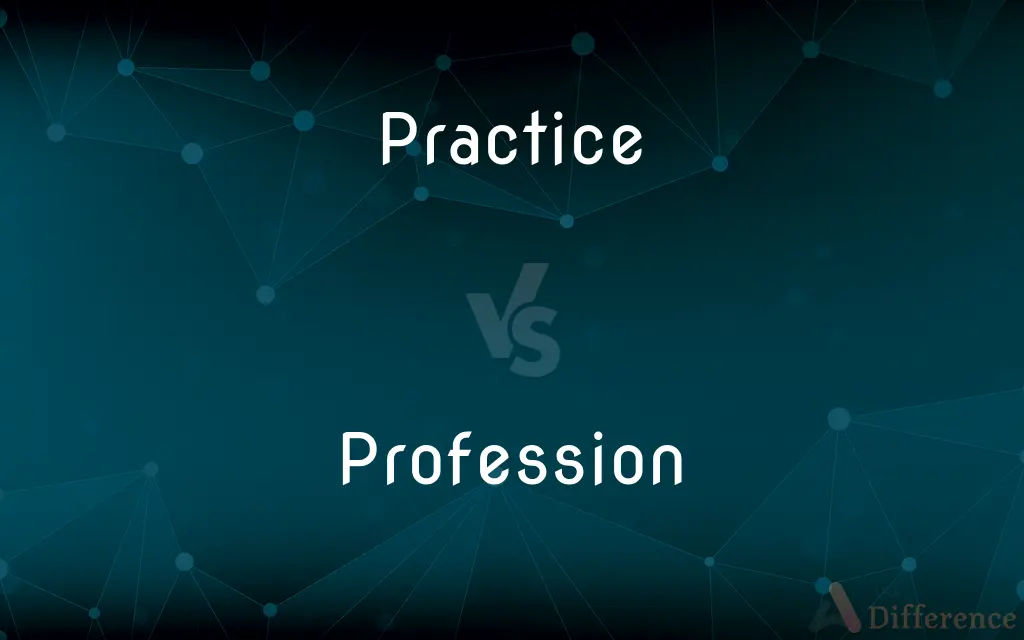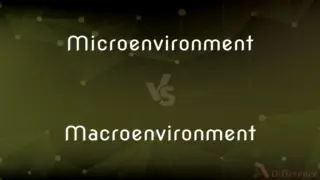Practice vs. Profession — What's the Difference?
By Tayyaba Rehman & Urooj Arif — Updated on March 29, 2024
Practice refers to the application or use of an idea, belief, or method, whereas profession denotes a paid occupation, especially one that involves prolonged training and a formal qualification.

Difference Between Practice and Profession
Table of Contents
ADVERTISEMENT
Key Differences
Practice encompasses the regular exercise of an activity or skill to maintain or improve proficiency, as well as the actual application of ideas, beliefs, or methods in various fields such as medicine, law, or art. Profession, on the other hand, is characterized by a formal recognition of expertise in a certain field, often requiring specialized education, training, and ethical standards.
While practice can refer to the act of doing something repeatedly to gain skill (e.g., practicing the piano) or the implementation of knowledge in a practical setting (e.g., the practice of law), profession specifically relates to the broader career or vocational path that one has chosen. This career is marked by specialized knowledge, education, and often a commitment to serve the public interest in some way.
The link between practice and profession is evident in how professionals engage in the practice of their expertise. The quality and ethics of one’s practice within a profession are essential for maintaining professional standards and trust with the public. For instance, in the medical profession, the practice of medicine is not only about applying medical knowledge but also about adhering to ethical principles that guide patient care.
Ethics play a crucial role in both concepts but in different ways. For practice, ethics guide the application of skills and knowledge, focusing on doing what is right in each action or decision. In professions, ethics are institutionalized into professional codes that dictate the standards of conduct for all members, focusing on responsibility, integrity, and accountability to the public.
Comparison Chart
Definition
The application or use of an idea, belief, or method.
A paid occupation requiring prolonged training and formal qualifications.
ADVERTISEMENT
Focus
On doing or implementing skills and knowledge.
On the career or vocational path chosen.
Requirement
Continuous improvement and application.
Specialized education, training, and often licensure.
Example Fields
Medicine, law, arts, sports.
Doctors, lawyers, engineers, accountants.
Ethical Considerations
Guided by principles in specific actions or decisions.
Governed by professional codes of conduct.
Purpose
To maintain or improve proficiency; practical application.
To signify expertise and commitment in a specific field.
Compare with Definitions
Practice
Regularly performing activities to improve skill.
Daily practice is essential for mastering a musical instrument.
Profession
Occupation with formal qualifications.
Architecture is a profession combining artistic creativity and engineering precision.
Practice
Habitual or customary performance.
It’s common practice to shake hands when meeting someone.
Profession
A career requiring specialized education.
Law is a profession that demands a high degree of ethical conduct.
Practice
The application of professional skills.
The practice of medicine requires both knowledge and empathy.
Profession
A vocation dedicated to serving the public.
Nursing is a profession known for its commitment to patient care.
Practice
The exercise of a profession.
She opened her own dental practice after years of working with a group.
Profession
Field requiring a license to practice.
The medical profession requires practitioners to be licensed by a medical board.
Practice
Implementation of ideas or methods.
The practice of sustainable farming is becoming increasingly popular.
Profession
A disciplined group of individuals adhering to ethical standards.
The accounting profession is governed by strict codes of ethics.
Practice
The actual application or use of an idea, belief, or method, as opposed to theories relating to it
The principles and practice of teaching
The recommendations proved too expensive to put into practice
Profession
A profession is an occupation founded upon specialized educational training, the purpose of which is to supply disinterested objective counsel and service to others, for a direct and definite compensation, wholly apart from expectation of other business gain. Medieval and early modern tradition recognized only three professions: divinity, medicine, and law, which were called the learned professions.
Practice
The customary, habitual, or expected procedure or way of doing of something
Modern child-rearing practices
Product placement is common practice in American movies
Profession
An occupation or career
"One of the highest compliments a child can pay a parent is to choose his or her profession" (Joan Nathan).
Practice
Repeated exercise in or performance of an activity or skill so as to acquire or maintain proficiency in it
It must have taken a lot of practice to become so fluent
Profession
An occupation, such as law, medicine, or engineering, that requires considerable training and specialized study.
Practice
US spelling of practise
Profession
The body of qualified persons in an occupation or field
Members of the teaching profession.
Practice
To do or perform habitually or customarily; make a habit of
Practices courtesy in social situations.
Profession
An act or instance of professing; a declaration.
Practice
To do or perform (something) repeatedly in order to acquire or polish a skill
Practice a dance step.
Profession
An avowal of faith or belief.
Practice
To give lessons or repeated instructions to; drill
Practiced the students in handwriting.
Profession
A faith or belief
Believers of various professions.
Practice
To work at, especially as a profession
Practice law.
Profession
Declaration of faith.
Practice
To carry out in action; observe
Practices a religion piously.
Profession
(religion) A promise or vow made on entering a religious order.
She died only a few years after her profession.
Practice
(Obsolete) To plot (something evil).
Profession
The declaration of belief in the principles of a religion; hence, one's faith or religion.
Practice
To do something repeatedly in order to acquire or polish a skill
With any musical instrument, you need to practice to get better.
Profession
Any declaration of belief, faith or one's opinion, whether genuine or (as now often implied) pretended.
Despite his continued professions of innocence, the court eventually sentenced him to five years.
Practice
To work at a profession
How long has that lawyer been practicing?.
Profession
Professional occupation.
Practice
To do or perform something habitually or repeatedly
Why not practice in the same manner that you preach?.
Profession
An occupation, trade, craft, or activity in which one has a professed expertise in a particular area; a job, especially one requiring a high level of skill or training.
My father was a barrister by profession.
Practice
(Archaic) To intrigue or plot.
Profession
(collective) The practitioners of such an occupation collectively.
His conduct is against the established practices of the legal profession.
Practice
A habitual or customary action or way of doing something
Makes a practice of being punctual.
Profession
The act of professing or claiming; open declaration; public avowal or acknowledgment; as, professions of friendship; a profession of faith.
A solemn vow, promise, and profession.
Practice
Repeated performance of an activity in order to learn or perfect a skill
Practice will make you a good musician.
Profession
That which one professed; a declaration; an avowal; a claim; as, his professions are insincere.
The Indians quickly perceive the coincidence or the contradiction between professions and conduct.
Practice
A session of preparation or performance undertaken to acquire or polish a skill
Goes to piano practice weekly.
Scheduled a soccer practice for Saturday.
Profession
That of which one professed knowledge; the occupation, if not mechanical, agricultural, or the like, to which one devotes one's self; the business which one professes to understand, and to follow for subsistence; calling; vocation; employment; as, the profession of arms; the profession of a clergyman, lawyer, or physician; the profession of lecturer on chemistry.
Hi tried five or six professions in turn.
Practice
(Archaic) The skill so learned or perfected.
Profession
The collective body of persons engaged in a calling; as, the profession distrust him.
Practice
The condition of being skilled through repeated exercise
Out of practice.
Profession
The act of entering, or becoming a member of, a religious order.
Practice
The act or process of doing something; performance or action
A theory that is difficult to put into practice.
Profession
The body of people in a learned occupation;
The news spread rapidly through the medical community
Practice
Exercise of an occupation or profession
The practice of law.
Profession
An occupation requiring special education (especially in the liberal arts or sciences)
Practice
The business of a professional person
An obstetrician with her own practice.
Profession
An open avowal (true or false) of some belief or opinion;
A profession of disagreement
Practice
A habitual or customary action or act
That company engages in questionable business practices. Facial tattooing is a standard practice among certain peoples.
Profession
Affirmation of acceptance of some religion or faith;
A profession of Christianity
Practice
(Law) The procedure for trial of cases in a court of law, usually specified by rules.
Practice
The act of tricking or scheming, especially with malicious intent.
Practice
A trick, scheme, or intrigue.
Practice
Repetition of an activity to improve a skill.
He will need lots of practice with the lines before he performs them.
Practice
An organized event for the purpose of performing such repetition.
Being on a team is hard: you're always having to go to practice while everyone else is taking it easy.
I have choir practice every Sunday after church.
Practice
The ongoing pursuit of a craft or profession, particularly in medicine or the fine arts.
Practice
(countable) A place where a professional service is provided, such as a general practice.
She ran a thriving medical practice.
Practice
The observance of religious duties that a church requires of its members.
Practice
A customary action, habit, or behaviour; a manner or routine.
It is the usual practice of employees there to wear neckties only when meeting with customers.
It is good practice to check each door and window before leaving.
Practice
Actual operation or experiment, in contrast to theory.
That may work in theory, but will it work in practice?
Practice
(legal) The form, manner, and order of conducting and carrying on suits and prosecutions through their various stages, according to the principles of law and the rules laid down by the courts.
This firm of solicitors is involved in family law practice.
Practice
Skilful or artful management; dexterity in contrivance or the use of means; stratagem; artifice.
Practice
(math) A easy and concise method of applying the rules of arithmetic to questions which occur in trade and business.
Practice
(US) practise
Practice
Frequently repeated or customary action; habitual performance; a succession of acts of a similar kind; usage; habit; custom; as, the practice of rising early; the practice of making regular entries of accounts; the practice of daily exercise.
A heart . . . exercised with covetous practices.
Practice
Customary or constant use; state of being used.
Obsolete words may be revived when they are more sounding or more significant than those in practice.
Practice
Skill or dexterity acquired by use; expertness.
Practice
Actual performance; application of knowledge; - opposed to theory.
There are two functions of the soul, - contemplation and practice.
There is a distinction, but no opposition, between theory and practice; each, to a certain extent, supposes the other; theory is dependent on practice; practice must have preceded theory.
Practice
Systematic exercise for instruction or discipline; as, the troops are called out for practice; she neglected practice in music.
Practice
Application of science to the wants of men; the exercise of any profession; professional business; as, the practice of medicine or law; a large or lucrative practice.
Practice is exercise of an art, or the application of a science in life, which application is itself an art.
Practice
Skillful or artful management; dexterity in contrivance or the use of means; art; stratagem; artifice; plot; - usually in a bad sense.
He sought to have that by practice which he could not by prayer.
Practice
A easy and concise method of applying the rules of arithmetic to questions which occur in trade and business.
Practice
The form, manner, and order of conducting and carrying on suits and prosecutions through their various stages, according to the principles of law and the rules laid down by the courts.
Practice
To do or perform frequently, customarily, or habitually; to make a practice of; as, to practice gaming.
Practice
To exercise, or follow, as a profession, trade, art, etc., as, to practice law or medicine.
Practice
To exercise one's self in, for instruction or improvement, or to acquire discipline or dexterity; as, to practice gunnery; to practice music.
Practice
To put into practice; to carry out; to act upon; to commit; to execute; to do.
As this advice ye practice or neglect.
Practice
To make use of; to employ.
In malice to this good knight's wife, I practiced Ubaldo and Ricardo to corrupt her.
Practice
To teach or accustom by practice; to train.
In church they are taught to love God; after church they are practiced to love their neighbor.
Practice
To perform certain acts frequently or customarily, either for instruction, profit, or amusement; as, to practice with the broadsword or with the rifle; to practice on the piano.
Practice
To learn by practice; to form a habit.
They shall practice how to live secure.
Practice first over yourself to reign.
Practice
To try artifices or stratagems.
He will practice against thee by poison.
Practice
To apply theoretical science or knowledge, esp. by way of experiment; to exercise or pursue an employment or profession, esp. that of medicine or of law.
[I am] little inclined to practice on others, and as little that others should practice on me.
Practice
A customary way of operation or behavior;
It is their practice to give annual raises
They changed their dietary pattern
Practice
Systematic training by multiple repetitions;
Practice makes perfect
Practice
Translating an idea into action;
A hard theory to put into practice
Differences between theory and praxis of communism
Practice
The exercise of a profession;
The practice of the law
I took over his practice when he retired
Practice
Knowledge of how something is usually done;
It is not the local practice to wear shorts to dinner
Practice
Learn by repetition;
We drilled French verbs every day
Pianists practice scales
Practice
Avail oneself to;
Apply a principle
Practice a religion
Use care when going down the stairs
Use your common sense
Practice non-violent resistance
Practice
Carry out or practice; as of jobs and professions;
Practice law
Practice
Engage in a rehearsal (of)
Common Curiosities
Can practice exist outside of a profession?
Yes, practice can refer to any repetitive activity aimed at improvement, such as practicing a sport or hobby, not just professional skills.
Can practices within a profession vary?
Yes, practices can vary widely within a profession, especially in fields like medicine or law, where specialties and subspecialties have their own sets of practices and norms.
What is professional development?
Professional development involves ongoing education and training to maintain, improve, and expand skills and knowledge within a profession.
Is every profession regulated by a professional body?
Many professions, especially those requiring specialized knowledge and ethics, are regulated by professional bodies, but not all. Some newer fields may not yet have formal oversight.
What role do ethics play in professional practice?
Ethics are fundamental to professional practice, guiding behavior and decisions to ensure responsibility, integrity, and public trust.
How does continuous practice impact a profession?
Continuous practice enhances expertise, ensures up-to-date knowledge, and maintains the high standards expected in a profession.
How does one enter a profession?
Entry typically requires completing specialized education and training, possibly passing a licensing exam, and adhering to the ethical and professional standards of the field.
What distinguishes a practice from a hobby?
Practice involves regular, systematic activities aimed at improving or maintaining proficiency, often within a professional or serious context, while a hobby is pursued for leisure and enjoyment.
Why is public trust important in a profession?
Public trust is crucial because professionals often work in capacities that affect individuals' lives, health, and well-being, requiring confidence in their competence and ethics.
Can a profession change over time?
Yes, professions evolve with advancements in knowledge, technology, societal needs, and ethical understanding, often leading to changes in practices, standards, and regulations.
Share Your Discovery

Previous Comparison
Microenvironment vs. Macroenvironment
Next Comparison
Frequency vs. OccurrenceAuthor Spotlight
Written by
Tayyaba RehmanTayyaba Rehman is a distinguished writer, currently serving as a primary contributor to askdifference.com. As a researcher in semantics and etymology, Tayyaba's passion for the complexity of languages and their distinctions has found a perfect home on the platform. Tayyaba delves into the intricacies of language, distinguishing between commonly confused words and phrases, thereby providing clarity for readers worldwide.
Co-written by
Urooj ArifUrooj is a skilled content writer at Ask Difference, known for her exceptional ability to simplify complex topics into engaging and informative content. With a passion for research and a flair for clear, concise writing, she consistently delivers articles that resonate with our diverse audience.
















































